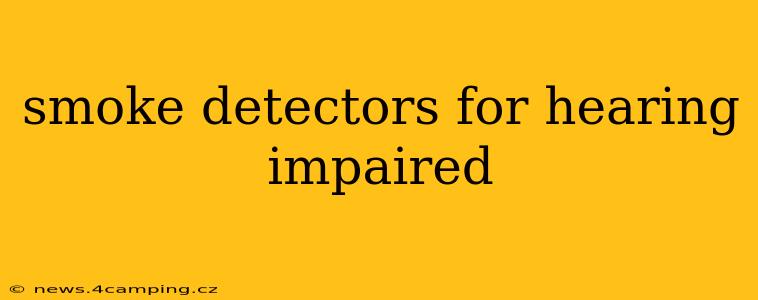For individuals with hearing impairments, ensuring home safety is paramount. Traditional smoke detectors, relying solely on audible alarms, present a significant challenge. Fortunately, technological advancements have produced a range of smoke detectors specifically designed to alert hearing-impaired individuals to potential fire hazards. This comprehensive guide explores the various options available, addressing common concerns and providing valuable information for choosing the best smoke detector for your specific needs.
What are the Best Types of Smoke Detectors for the Hearing Impaired?
Several types of smoke detectors cater specifically to the needs of the hearing impaired. These generally incorporate visual and/or vibratory alerts alongside, or instead of, audible alarms. The most common types include:
-
Smoke detectors with strobe lights: These detectors emit a bright flashing light when smoke is detected, providing a highly visible alert. The intensity and frequency of the flashing light are typically designed to be easily noticeable even from a distance.
-
Smoke detectors with bed shakers: These devices use a vibrating pad placed under a mattress or pillow to alert sleepers. The strong vibrations are effective at waking individuals, even those with profound hearing loss.
-
Smoke detectors with combined alerts: Many advanced models combine visual and vibratory alerts, offering a multi-sensory approach for maximum effectiveness. This combination ensures that individuals are alerted regardless of their sleeping position or the level of ambient light.
-
Smoke detectors that connect to existing alert systems: Some systems allow integration with existing communication devices for the deaf and hard of hearing. This could involve a connection to a visual alert system already in use in the home, providing a seamless and comprehensive alert system.
What Features Should I Look For in a Smoke Detector for the Hearing Impaired?
Beyond the basic alert type, several additional features can significantly enhance the safety and usability of smoke detectors for the hearing impaired:
-
Battery backup: Essential to ensure the detector functions even during a power outage.
-
Interconnected alarms: These systems link multiple detectors throughout the home. When one detector senses smoke, all detectors sound their alarms (visual and/or vibratory), maximizing the chance of alerting everyone in the house.
-
Low-battery warnings: A clear visual indicator that the battery needs replacing, preventing unexpected failures.
-
Easy installation: Choose detectors with simple and clear installation instructions, ideally designed for those with limited mobility or dexterity.
How Do I Choose the Right Smoke Detector for My Needs?
Selecting the right smoke detector depends on individual needs and preferences. Consider these factors:
-
Severity of hearing loss: Individuals with mild hearing loss might benefit from a strobe light alone, while those with profound hearing loss may require a combination of strobe and bed shaker.
-
Sleeping habits: If you sleep deeply, a bed shaker is highly recommended to ensure you wake up.
-
Home layout: Strategically placing detectors in key locations maximizes the chance of early detection.
-
Budget: Prices vary significantly; consider your budget and the features you require.
Can I Install a Smoke Detector for the Hearing Impaired Myself?
While most smoke detectors are designed for DIY installation, it's essential to follow the manufacturer's instructions carefully. If you have any doubts or difficulties, it’s always best to seek assistance from a qualified electrician or fire safety professional. They can ensure correct installation and help you plan your home's fire safety strategy effectively.
Are There Any Government Regulations or Standards for Smoke Detectors for the Hearing Impaired?
Many countries have building codes and fire safety regulations that mandate the installation of smoke detectors in residential dwellings. However, the specific requirements regarding the types of detectors (e.g., those suitable for the hearing impaired) may vary. Consult your local fire department or building codes authority for the most up-to-date and region-specific guidelines.
What are the Maintenance Requirements for Smoke Detectors for the Hearing Impaired?
Regular maintenance is crucial for ensuring the continued functionality of smoke detectors. This includes:
- Testing regularly: Test the alarms (visual and auditory if present) monthly to ensure they are working correctly.
- Replacing batteries: Replace batteries annually, or as soon as the low-battery warning light appears.
- Cleaning: Regularly clean the detector's sensors to remove dust and debris that could interfere with its operation.
By following these steps, you can maintain your smoke detectors and ensure they are ready to provide critical warnings in case of a fire. Regular checks also instill a sense of proactive safety within the household.
This guide provides a starting point for your research into smoke detectors for the hearing impaired. Remember, prioritizing safety is crucial, and selecting the right detector can provide invaluable peace of mind.
